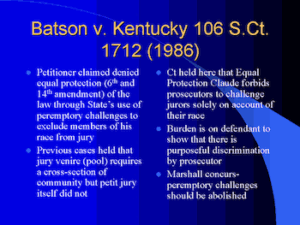
Batson v. Kentucky
*On this date in 1986, Batson v. Kentucky was decided. A landmark United States Supreme Court decision ruled that a prosecutor's use of a peremptory challenge in a criminal case—dismissing jurors without stating a valid cause—may not be used to exclude jurors based solely on their race.
The Court ruled that this practice violated the Equal Protection Clause of the Fourteenth Amendment. The case gave rise to the term Batson challenge, an objection to a peremptory challenge based on the standard established by the Supreme Court's decision in this case. Subsequent jurisprudence has resulted in the extension of Batson to civil cases (Edmonson v. Leesville Concrete Company) and cases where jurors are excluded based on sex (J.E.B. v. Alabama ex T.B.).
The principle was established by several state courts, including the California Supreme Court in 1978, the Massachusetts Supreme Judicial Court in 1979, and the Florida Supreme Court in 1984. In a 7–2 decision authored by Justice Lewis Powell, the Supreme Court ruled in Batson's favor. The Court overruled Swain v. Alabama by lowering the burden of proof that a defendant must meet to make a prima facie case of purposeful discrimination.
In Swain, the Court had recognized that a "State's purposeful or deliberate denial to Negroes on account of race of participation as jurors in the administration of justice violates the Equal Protection Clause" but that the defendant had the burden of proving a systematic striking of Black jurors throughout the county, that is, that the peremptory challenge system was being perverted. In Batson, the Court ruled that the defendant could make a prima facie case for purposeful racial discrimination in jury selection by relying on the record only in his case.